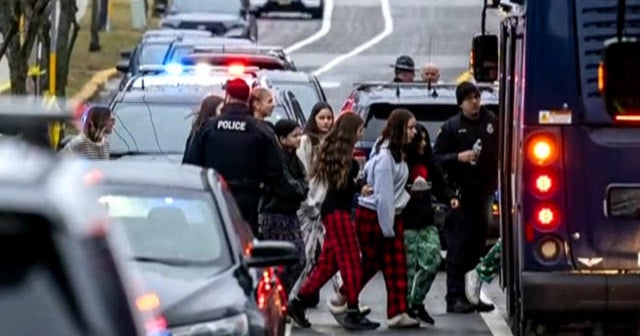CBS News
Watch out for these 3 expensive money mistakes in June, experts say

Getty Images/iStockphoto
As the summer gets underway, you may be looking forward to unwinding. At the same time, though, it’s important to not get too lax about your finances.
After all, in today’s unusual economic climate, in which inflation remains persistently high and interest rates make borrowing difficult, it’s easy to make money mistakes that cost you more than they would otherwise. Fortunately, knowing what to watch out for and how to manage these types of financial challenges can ease your financial situation.
Don’t let your credit card debt mistakes weigh you down this summer. Find out your debt relief options here.
Watch out for these 3 expensive money mistakes in June, experts say
Be sure to watch out for these three expensive money mistakes this month — and as we head into the rest of the summer:
Carrying a credit card balance from month to month
With the average credit card interest rate currently over 21%, and with many card rates closer to 30%, carrying a credit card balance from month to month can be particularly costly right now. And, if you’re just making the minimum monthly payments, you could end up paying more in interest than the actual balance on your card.
If you face a situation where you’re struggling to keep up with credit card payments, you might consider using a reputable debt relief service, negotiating for debt forgiveness or using a debt consolidation loan to try and lower your interest rate and get a more manageable payment.
Ideally, though, you can avoid this money mistake by not carrying an unmanageable balance.
“When going on summer vacation with family or taking on summer projects like fixing up your home or garden, it can be tempting to purchase everything at one time, put it all on your card, and deal with paying it off later. This strategy can help cover your purchases in the moment, but it will lead to a hefty bill when your monthly statement comes due,” says Mary Hines Droesch, head of consumer, small business and wealth management banking and lending products at Bank of America.
“To avoid putting every purchase on your card, consider saving up for big-ticket purchases over time or buying things piecemeal over the course of a few months,” Droesch adds.
Explore your top credit card debt relief options online now.
Not shopping around before borrowing
While you don’t want to carry around a credit card balance if you can avoid it, sometimes you still need to borrow money, such as for housing, transportation, education or another large expense.
Whatever the case may be, not shopping around before borrowing is a mistake, as even a small difference in interest rates can add up over time. For example, on a $400,000 mortgage, the difference between a 7% interest rate and 6.75% is nearly $24,000 in interest over 30 years.
But when shopping around before borrowing, you may want to consider factors beyond the interest rate to assess the full costs of borrowing. For example, if you’re opening a new credit card — even if you intend to pay it off in full every month — look at the interest rate, but also look at the other factors, like the annual fee and credit limit.
Having a higher credit limit could potentially tempt you into spending more, so you should take that into account during the process. That said, a higher limit can also help when it comes to maintaining a low credit utilization ratio, so there’s a balance you need to consider.
“One of the mistakes people make is not keeping their credit utilization ratio — credit balance divided by available credit — at a reasonably low level on revolving debt, like credit cards. Most experts state that you should maintain utilization of your revolving credit below 30%,” says Marito Domingo, chief credit officer and chief financial officer at First Tech Federal Credit Union.
“If you can show that you’re responsible managing both revolving debt and installment debt, then your credit score won’t take as big of a hit during the summer season. If not, the rate you pay on your revolving balance could go up, pushing up the cost of the purchases you made,” Domingo adds.
Getting caught up in the moment
You may also want to avoid getting too caught up in summer fun at the expense of your financial future. After all, doing so could be a big, and costly, mistake.
“Summer is all about spending time outside in beautiful weather, so it can be hard to say no to a fun outing like a day at the beach or a concert, but it’s important to keep in mind your long-term savings goals,” says Julie Beckham, AVP/financial education development and strategy officer at Rockland Trust.
“Whether you’re saving for a new car, down payment for a home, or tuition for the fall, don’t forget what you’re working toward as an incentive to spend less in the moment. And if you feel like you just might forget, set automatic transfers from your checking to your savings account so you don’t have a chance to spend that money on anything else,” Beckham adds.
The bottom line
Consider making the start of summer the beginning of better financial habits. Rather than ending up in a difficult debt situation or simply overspending when it comes to borrowing costs or summer excursions, think carefully about where your money is going before you’re in over your head.
CBS News
Head of Russia’s nuclear defense forces killed in Moscow blast triggered by device hidden in scooter, officials say

Moscow — The head of Russia’s Nuclear, Biological, and Chemical Defense Forces, Lt. General Igor Kirillov, was killed along with his deputy early Tuesday in an explosion in Moscow, Russia’s Investigative Committee said.
An explosive device hidden in an electronic scooter went off outside a residential building as the two men left the structure, Agence France-Presse cites investigators as saying.
ALEXANDER NEMENOV / AFP via Getty Images
“Investigators, forensic experts and operational services are working at the scene,” committee spokesperson Svetlana Petrenko said in a statement. “Investigative and search activities are being carried out to establish all the circumstances around this crime.”
ALEXANDER NEMENOV / AFP via Getty Images
The committee carries out responsible major investigations in Russia.
Kirillov was sentenced in absentia by a Ukrainian court on Dec. 16 for the use of banned chemical weapons in Ukraine during Russia’s military operation in Ukraine that started in Feb. 2022.
AFPTV / AFP via Getty Images
Ukraine’s Security Service, the SBU, said it had recorded more than 4,800 uses of chemical weapons on the battlefield since February 2022, particularly K-1 combat grenades.
During the almost 3-year operation, Russia has made small but steady territorial gains to the nearly one-fifth of Ukraine it already controls.
Kirillov had been in his post since 2017, AFP notes.
CBS News
Earthquake rocks Pacific island nation of Vanuatu, deaths feared, U.S. embassy damaged

A powerful earthquake hit the Pacific island nation of Vanuatu Tuesday, smashing buildings in the capital, Port Vila, including one housing the embassies of the U.S. and other nations. A witness told Agence France-Presse of bodies seen in the city.
Dan McGarry, a journalist with the Organized Crime and Corruption Reporting Project based in Vanuatu, told the Reuters news agency in an interview that police said at least one person had been killed and injured people had been taken to hospital.
“It was the most violent earthquake I’ve experienced in my 21 years living in Vanuatu and in the Pacific Islands. I’ve seen a lot of large earthquakes, never one like this,” he said.
The 7.3-magnitude quake struck at a depth of 35 miles, off the coast of Efate, Vanuatu’s main island, at 12:47 p.m. local time, according to the U.S. Geological Survey.
The ground floor of a building housing the U.S, French and other embassies had been crushed under higher floors, resident Michael Thompson told AFP by satellite phone after posting images of the destruction on social media.
“That no longer exists. It is just completely flat. The top three floors are still holding but they have dropped,” Thompson said.
“If there was anyone in there at the time, then they’re gone.”
Thompson said the ground floor housed the U.S. embassy, but that couldn’t be immediately confirmed.
A photo showed significant damage to the building:
STR / AFP via Getty Images
The United States has closed the embassy until further notice, citing “considerable damage” to the mission, the U.S. embassy in Papua New Guinea said in a message on social media. “Our thoughts are with everyone affected by this earthquake,” the embassy said.
The New Zealand High Commission, housed in the same building, suffered “significant damage,” a statement from Foreign Minister Winston Peters’ office said, adding that, “New Zealand is deeply concerned about the significant earthquake in Vanuatu, and the damage it has caused.”
Thompson, who runs a zipline adventure business in Vanuatu, said, “There’s people in the buildings in town. There were bodies there when we walked past.”
A landslide on one road had covered a bus, he said, “so there’s obviously some deaths there.”
The quake also collapsed at least two bridges, and most mobile networks were cut off, Thompson said.
“They’re just cracking on with a rescue operation. The support we need from overseas is medical evacuation and skilled rescue, (the) kind(s) of people that can operate in earthquakes,” he said.
STR / AFP via Getty Images
Video footage posted by Thompson and verified by AFP showed uniformed rescuers and emergency vehicles working on a building where an external roof had collapsed onto a number of parked cars and trucks.
The streets of the city were strewn with broken glass and other debris from damaged buildings, the footage showed.
Nibhay Nand, a Sydney-based pharmacist with businesses across the South Pacific, said he had spoken to staff in Port Vila who said most of the store there had been “destroyed” and that other buildings nearby had “collapsed.”
“We are waiting for everyone to get online to know how devastating and traumatic this will be,” Nand told AFP.
A tsunami warning was issued after the quake, with waves of up to three feet forecast for some areas of Vanuatu, but it was soon lifted by the Pacific Tsunami Warning Center.
Earthquakes are common in Vanuatu, a low-lying archipelago of 320,000 people that straddles the seismic Ring of Fire, an arc of intense tectonic activity that stretches through Southeast Asia and across the Pacific Basin.
Vanuatu is ranked as one of the countries most susceptible to natural disasters such as earthquakes, storm damage, flooding and tsunamis, according to the annual World Risk Report.
CBS News
12/16: CBS Evening News – CBS News

Watch CBS News
Be the first to know
Get browser notifications for breaking news, live events, and exclusive reporting.







